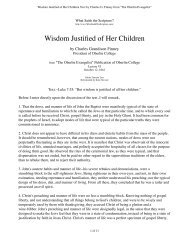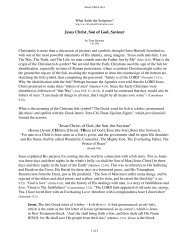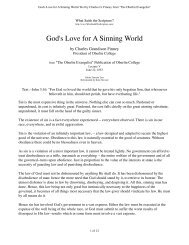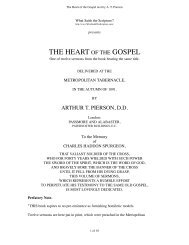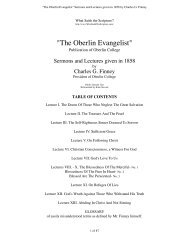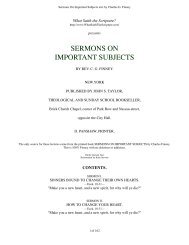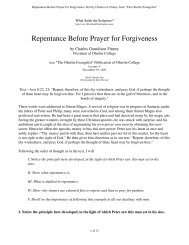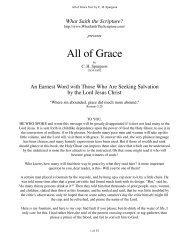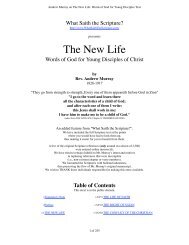Don't Give Up On God - What Saith The Scripture?
Don't Give Up On God - What Saith The Scripture?
Don't Give Up On God - What Saith The Scripture?
Create successful ePaper yourself
Turn your PDF publications into a flip-book with our unique Google optimized e-Paper software.
<strong>Don't</strong> <strong>Give</strong> <strong>Up</strong> <strong>On</strong> <strong>God</strong><br />
<strong>What</strong> <strong>Saith</strong> the <strong>Scripture</strong>?<br />
http://www.<strong>What</strong><strong>Saith</strong><strong>The</strong><strong>Scripture</strong>.com/<br />
<strong>The</strong> Death of Selfishness<br />
Or, Understanding How <strong>God</strong> Prevents Sin<br />
"If ye fulfil the Royal Law according to the <strong>Scripture</strong>, Thou shalt love thy neighbour as thyself, ye do<br />
well"<br />
(James 2:8).<br />
Preface<br />
by Tom Stewart<br />
9-12-2003<br />
------------------------------------------------------------------------<br />
Christianity may differ about what things are considered sinful, but never can it honestly resolve that<br />
neither they nor <strong>God</strong> cares whether sin stalks His Kingdom or holds His people captive. "15 But as He<br />
which hath called you is Holy, so be ye holy in all manner of conversation; 16 because it is written, Be<br />
ye holy; for I am Holy" (1Peter 1:15-16). Bondage to sin and sinning means that self is enthroned in the<br />
human heart, but Christ is crowned the Rightful King of Our Soul every time we choose to lovingly<br />
obey His precepts and walk in His Light-- which is the death of selfishness. "63 I am a companion of<br />
all them that fear <strong>The</strong>e, and of them that keep Thy Precepts... 105 Thy Word is a Lamp unto my feet,<br />
and a light unto my path" (Psalm 119: 63, 105). <strong>The</strong> legitimate concern of all True Christians then, is how<br />
to preserve and promote the Reign of Christ in our hearts by preventing the resurrection of selfishness.<br />
"2 Walk in love, as Christ also hath loved us, and hath given Himself for us an Offering and a<br />
Sacrifice to <strong>God</strong> for a Sweetsmelling Savour. 3 But fornication, and all uncleanness, or covetousness,<br />
let it not be once named among you, as becometh saints" (Ephesians 5:2-3). We, who promote the Eternal<br />
Reign of Christ as King, seek first His Kingdom and His Righteousness, and seek also the death of<br />
selfishness in all, but especially in everyone that "nameth the Name of Christ" (2Timothy 2:19). <strong>The</strong><br />
purpose of this article is to advance the understanding that will equip every willing Christian to<br />
promote and sustain the death of selfishness and nurture the Reign of Christ in their heart. "And I<br />
heard as it were the voice of a great multitude, and as the voice of many waters, and as the voice of<br />
mighty thunderings, saying, Alleluia: for the LORD <strong>God</strong> Omnipotent reigneth" (Revelation 19:6).<br />
<strong>The</strong> Dilemma of Selfishness Is Overcome by Understanding<br />
<strong>The</strong> sheer force of our understanding is never as weighty as the Commandments of the King of<br />
Heaven (Daniel 4:37), but "through Wisdom is an house builded; and by Understanding it is established"<br />
(Proverbs 24:3). In the Wisdom of <strong>God</strong>, it is reasonable that the "Blessed and <strong>On</strong>ly Potentate, the KING<br />
of Kings, and LORD of Lords" (1Timothy 6:15), Who is the "King of Saints" (Revelation 15:3), would have<br />
a Royal Law. "If ye fulfil the Royal Law according to the <strong>Scripture</strong>, Thou shalt love thy neighbour as<br />
thyself, ye do well" (James 2:8). And, as lowly as any Saint is, we have, nonetheless, been elevated by<br />
an act of <strong>God</strong> into the royalty of His family, "and hast made us unto our <strong>God</strong> kings and priests: and<br />
we shall reign on the Earth" (5:10). But, how could <strong>God</strong> be so willing to do such honor to those who<br />
still struggle with themselves as whether they or Christ should be the king of their lives? "Not that we<br />
1 of 10
<strong>Don't</strong> <strong>Give</strong> <strong>Up</strong> <strong>On</strong> <strong>God</strong><br />
are sufficient of ourselves to think any thing as of ourselves; but our Sufficiency is of <strong>God</strong>"<br />
(2Corinthians 3:5). His Royal Law is Just, because He is Just. "<strong>The</strong>re is no <strong>God</strong> else beside Me; a Just<br />
<strong>God</strong> and a Saviour; there is none beside Me" (Isaiah 45:21). We know that it is right to obey such an<br />
Edict, because it summarizes the whole of our obligation to both our King and to our fellow man.<br />
"Love worketh no ill to his neighbour: therefore Love is the fulfilling of the Law" (Romans 13:10).<br />
Every time we shame ourselves by elevating ourselves above our King, His Law, and our neighbours,<br />
we must "repent, and do the first works" (Revelation 2:5). This satisfies our King and His Law of Love;<br />
however, if we could have but Greater Understanding of our <strong>God</strong>, His Word, and His Ways, could we<br />
not better cooperate with our Royal <strong>God</strong> in preventing such selfishness from raising its ugly head? "23<br />
Search me, O <strong>God</strong>, and know my heart: try me, and know my thoughts: 24 and see if there be any<br />
wicked way in me, and lead me in <strong>The</strong> Way Everlasting" (Psalm 139:23-24).<br />
Self-Interest vs. Selfishness<br />
Even before man arrives at the moral agency of knowing right from wrong-- and only the rejection of<br />
the Truth makes him a sinner-- man has the capacity of self-interest. "No man ever yet hated his own<br />
flesh; but nourisheth and cherisheth it" (Ephesians 5:29). Before and after one has come to moral agency,<br />
avoiding pain (e.g., pulling your hand away from a hot object) and seeking pleasure (e.g., drinking<br />
when you're thirsty) are self-interests that may be compared to homeostasis, which is the body's<br />
physiological mechanism for maintaining its internal equilibrium. This was true of Christ in His<br />
human body, while upon Earth ("I thirst" [John 19:28]) and equally true of His spiritual relationship now<br />
to the Church ("No man ever yet hated his own flesh; but nourisheth and cherisheth it, even as the<br />
LORD the Church: For we are members of His body" [Ephesians 5:29, 30]). But, of course, once a moral<br />
agent understands that his duty requires a certain amount of pain to accomplish his obedience to <strong>God</strong>,<br />
then neither pain nor pleasure must interfere with his loving obedience to <strong>God</strong>. "6 I [Christ] gave My<br />
back to the smiters, and My cheeks to them that plucked off the hair: I hid not My face from shame<br />
and spitting. 7 For the LORD GOD will help Me; therefore shall I not be confounded: therefore have I<br />
set My face like a flint, and I know that I shall not be ashamed" (Isaiah 50:6-7).<br />
So intrinsic is it, this instinct for physical self-interest, that unless the mind is altered by drugs or other<br />
physical means, an individual cannot be alive without a healthy measure of physical self-interest. "15<br />
Butter and honey shall He eat, that He may know to refuse the evil, and choose the Good. 16 For<br />
before the Child shall know to refuse the evil, and choose the Good, the land that thou abhorrest shall<br />
be forsaken of both her kings" (Isaiah 7:15-16). And yet, even Lucifer-- before he fell-- as an holy angel<br />
in <strong>God</strong>'s Heaven, was capable of exercising the selfishness that is characteristic of all sin. "12 How art<br />
thou fallen from Heaven, O Lucifer, son of the morning! how art thou cut down to the ground, which<br />
didst weaken the nations! 13 For thou hast said in thine heart, I will ascend into Heaven, I will exalt<br />
my throne above the stars of <strong>God</strong>: I will sit also upon the mount of the congregation, in the sides of<br />
the north: 14 I will ascend above the heights of the clouds; I will be like the most High. 15 Yet thou<br />
shalt be brought down to Hell, to the sides of the pit" (Isaiah 14:12-15). It becomes apparent that<br />
self-interest is selfishness only when we refuse to conform to the Truth that we know obligates us.<br />
"<strong>The</strong>refore to him that knoweth to do good, and doeth it not, to him it is sin" (James 4:17). For this<br />
reason, the nineteenth century evangelist Charles G. Finney -- http://whatsaiththescripture.com/Fellowship<br />
/Charles.G.Finney.html -- said, "Selfishness is sin." To do what we know we shouldn't or to refuse to do<br />
2 of 10
<strong>Don't</strong> <strong>Give</strong> <strong>Up</strong> <strong>On</strong> <strong>God</strong><br />
what we know we should, is sin. Even if the forbidden activity is delectably inviting or the<br />
commanded action is unpleasantly disagreeable, we engage in sin, i.e., "sin is the transgression of the<br />
Law" (1John 3:4), when we walk contrary to the Moral Law of Love. "Whosoever shall keep the whole<br />
Law, and yet offend in one point, he is guilty of all" (James 2:10). Love-- an unselfish Love, which<br />
"seeketh not her own" (1Corinthians 13:5)-- is the whole of what <strong>God</strong> requires of man. "37 Jesus said unto<br />
him, Thou shalt love the LORD thy <strong>God</strong> with all thy heart, and with all thy soul, and with all thy<br />
mind. 38 This is the First and Great Commandment. 39 And the Second is like unto it, Thou shalt love<br />
thy neighbour as thyself. 40 <strong>On</strong> these two Commandments hang all the Law and the Prophets" (Matthew<br />
22:37-40).<br />
Sin willfully, selfishly chooses to walk contrary to the Truth. "Whosoever committeth sin<br />
transgresseth also the Law: for sin is the transgression of the Law" (1John 3:4). How, then, can we see<br />
the continued death of selfishness? "O wretched man that I am! who shall deliver me from the body of<br />
this death?" (Romans 7:24). Well, if you mean that we should have no more physical self-interest-- that<br />
will never be until we get to Heaven. "Eye hath not seen, nor ear heard, neither have entered into the<br />
heart of man, the things which <strong>God</strong> hath prepared for them that love Him" (1Corinthians 2:9). <strong>The</strong> natural<br />
limitations of being a moral agent clothed with flesh, place us in the position of being always with<br />
the capacity to sin without necessarily the bent, inclination, or tendency to sin; therefore, holiness or<br />
godly living, manwardly speaking, must simply be our willingness to obey <strong>God</strong> and our<br />
commitment to refuse all temptation to sin, i.e., we cannot sin because we will not sin.<br />
"Whosoever is born of <strong>God</strong> doth not commit sin; for His seed remaineth in him: and he cannot sin,<br />
because he is born of <strong>God</strong>" (1John 3:9). <strong>God</strong>wardly speaking, Holiness is <strong>God</strong> spiritually cleansing and<br />
thereby separating man from his sin, while giving him an aversion to sinning. "5 <strong>The</strong>n said I, Woe is<br />
me! for I am undone; because I am a man of unclean lips, and I dwell in the midst of a people of<br />
unclean lips: for mine eyes have seen the King, the LORD of Hosts. 6 <strong>The</strong>n flew one of the seraphims<br />
unto me, having a live coal in his hand, which he had taken with the tongs from off the altar: 7 and he<br />
laid it upon my mouth, and said, Lo, this hath touched thy lips; and thine iniquity is taken away, and<br />
thy sin purged" (Isaiah 6:5-7). "<strong>What</strong> <strong>God</strong> hath cleansed, that call not thou common" (Acts 11:9). But, if<br />
you mean that we can live without the bondage of continually sinning, then "thanks be to <strong>God</strong>,<br />
which giveth us the victory through our LORD Jesus Christ" (1Corinthians 15:57)! Wonderful provision<br />
has been made to keep us from walking in selfishness! "1 <strong>The</strong>re is therefore now no condemnation to<br />
them which are in Christ Jesus, who walk not after the flesh, but after the Spirit. 2 For the Law of the<br />
Spirit of Life in Christ Jesus hath made me free from the law of sin and death" (Romans 8:1-2).<br />
Love Breaks the Cycle of Selfishness<br />
<strong>The</strong> exercise of True Love is the immediate death of selfishness, i.e., "[love] seeketh not her own"<br />
(1Corinthians 13:5); and yet, much of Professed Christianity will confess that sinning and repenting is<br />
easier than preventing the subsequent repetition of that sin. "Return, ye backsliding children, and I<br />
will heal your backslidings. Behold, we come unto <strong>The</strong>e; for Thou art the LORD our <strong>God</strong>" (Jeremiah<br />
3:22). Remember, however, <strong>Scripture</strong> teaches us that much of what is called repentance is not<br />
repentance. "For godly sorrow worketh repentance to Salvation not to be repented of: but the sorrow<br />
of the world worketh death" (2Corinthians 7:10). Consequently, with so many false and questionable<br />
repentances, returning to a former vice or sin would then be relatively easy. "We know that whosoever<br />
3 of 10
<strong>Don't</strong> <strong>Give</strong> <strong>Up</strong> <strong>On</strong> <strong>God</strong><br />
is born of <strong>God</strong> sinneth not; but he that is begotten of <strong>God</strong> keepeth himself, and that wicked one<br />
toucheth him not" (1John 5:18). <strong>The</strong> Truth is that no man will ever do as he is able to do or ought to do<br />
without the intervention of the Grace of <strong>God</strong>. "But by the Grace of <strong>God</strong> I am what I am: and His<br />
Grace which was bestowed upon me was not in vain; but I laboured more abundantly than they all:<br />
yet not I, but the Grace of <strong>God</strong> which was with me" (1Corinthians 15:10). For this reason, when we ever<br />
do choose to repent, believe, and obey, we may trust that it is "<strong>God</strong> which worketh in [us] both to will<br />
and to do of His Good Pleasure" (Philippians 2:13). Since obedience to <strong>God</strong> is the unselfishness of<br />
Love, then selfishness dies the moment we choose to obey. "He that hath My Commandments, and<br />
keepeth them, he it is that loveth Me: and he that loveth Me shall be loved of My Father, and I will<br />
love him, and will manifest Myself to him" (John 14:21). <strong>On</strong> the other hand, we resurrect selfishness,<br />
when we choose to disobey. "<strong>The</strong> backslider in heart shall be filled with his own ways" (Proverbs 14:14).<br />
We must then continually entrust the LORD as the Keeper of Our Soul to deliver us from sin and<br />
sinning. "O keep my soul, and deliver me: let me not be ashamed; for I put my trust in <strong>The</strong>e" (Psalm<br />
25:20).<br />
<strong>What</strong> Is Baggage From a Formerly Sinful Condition?<br />
Humanly speaking, we may prefer to forego the pain of the pruning, but we are the branches of Christ<br />
the Vine. "I am the True Vine, and My Father is the Husbandman" (John 15:1). Just as vines must be<br />
pruned, the sin which we committed before Salvation and during backsliding has left a negative<br />
impact upon our lives, affecting the way we treat our LORD and one another. "<strong>What</strong>soever a man<br />
soweth, that shall he also reap" (Galatians 6:7). Sin is like a trap of quicksand that deceives us-- when we<br />
should have known better-- and sucks us down to complete our destruction, as we powerlessly<br />
struggle, while we are neglecting the understanding that even the youngest of the children of <strong>God</strong> has<br />
been given. "And that from a child thou hast known the Holy <strong>Scripture</strong>s, which are able to make thee<br />
wise unto Salvation through Faith which is in Christ Jesus" (2Timothy 3:15). If we would only remember<br />
that it is a "Faith which worketh by Love" (Galatians 5:6), we would firmly hang on, while the Spirit of<br />
<strong>God</strong> wisely guides us to a better understanding that would keep us from stumbling into sin, again. "24<br />
Now unto Him that is able to keep you from falling, and to present you faultless before the presence<br />
of His Glory with Exceeding Joy, 25 to the <strong>On</strong>ly Wise <strong>God</strong> Our Saviour, be Glory and Majesty,<br />
Dominion and Power, both now and ever" (Jude 24-25).<br />
<strong>The</strong> following discussion of "baggage from a formerly sinful condition" is a key point in the<br />
understanding of the death of selfishness. Though we have walked honestly before <strong>God</strong> since last<br />
repenting, our Heavenly Husbandman must wisely choose the time and circumstance to make the<br />
incision to remove the vestiges of that baggage from a formerly sinful condition-- which if we refuse<br />
to cooperate becomes a presently sinful condition. "Every branch in Me that beareth not fruit He<br />
taketh away: and every branch that beareth fruit, He purgeth it, that it may bring forth more fruit" (John<br />
15:2). And, what is implied by this phrase, baggage from a formerly sinful condition? Rest assured that<br />
<strong>Scripture</strong> unequivocally pronounces a Unity of Moral Action for any Moral Agent, i.e., you cannot be<br />
both holy and sinful at the same time. "No man can serve two masters: for either he will hate the one,<br />
and love the other; or else he will hold to the one, and despise the other. Ye cannot serve <strong>God</strong> and<br />
mammon" (Matthew 6:24). <strong>The</strong> question of how <strong>God</strong> accounts man holy or sinful is answered in the<br />
Proverbs, where it is demonstrated that the thought and intent of the heart is what <strong>God</strong> measures, i.e.,<br />
4 of 10
<strong>Don't</strong> <strong>Give</strong> <strong>Up</strong> <strong>On</strong> <strong>God</strong><br />
"For as he thinketh in his heart, so is he: Eat and drink, saith he to thee; but his heart is not with thee"<br />
(Proverbs 23:7). Jesus, further, clearly repeated the same principle that <strong>God</strong> determines our moral<br />
position by our heart intent, when He gave His explanation of the true nature of adultery in the<br />
Sermon on the Mount. "27 Ye have heard that it was said by them of old time, Thou shalt not commit<br />
adultery: 28 But I say unto you, That whosoever looketh on a woman to lust after her hath committed<br />
adultery with her already in his heart" (Matthew 5:27-28). <strong>On</strong>ce we have been regenerated from a lost<br />
condition or restored from backsliding, we are considered holy and clean. "If we confess our sins, He<br />
is Faithful and Just to forgive us our sins, and to cleanse us from all unrighteousness" (1John 1:9). This<br />
perfection in the eyes of <strong>God</strong>, of course, cannot mean that we need no further change or growth in<br />
holiness, for we are still commanded, "Grow in Grace, and in the Knowledge of our LORD and<br />
Saviour Jesus Christ" (2Peter 3:18). That holiness or perfection must mean only that we, the finite<br />
creature, are accounted by <strong>God</strong> to be entirely clean in our heart intent, just as He, the Infinite Creator,<br />
is Clean, Pure, and Holy in His heart intent. "Be ye therefore perfect, even as your Father which is in<br />
Heaven is Perfect" (Matthew 5:48).<br />
Returning to the phrase, baggage from a formerly sinful condition, since <strong>God</strong> accepts the repentance<br />
of lost sinners and backsliders in whatever condition they repent, i.e., "him that cometh to Me I will in<br />
no wise cast out" (John 6:37), we will still have all the baggage that we obtained and produced in our<br />
previously sinful condition-- unless, of course, <strong>God</strong> miraculously and mercifully removes some of<br />
their evil effects, especially if they are points of our contention with Him, e.g., addiction to drugs<br />
inexplicably taken away at the time of repentance. A few examples of the negative baggage that a<br />
Saint may carry over from his past sinful days are:<br />
(1) a preoccupation with self that embarrasses even the definition of a lawful self-interest,<br />
e.g., inattention when others speak, but with the swift tendency to respond: "Wherefore,<br />
my beloved brethren, let every man be swift to hear, slow to speak, slow to wrath" (James<br />
1:19),<br />
(2) evil habits, e.g., habitual cursing and swearing: "My brethren, swear not, neither by<br />
Heaven, neither by the Earth, neither by any other oath: but let your yea be yea; and your<br />
nay, nay; lest ye fall into condemnation" (James 5:12),<br />
(3) mistaken opinions, flawed ideas, and incorrect conclusions, e.g., expecting to eat<br />
without a commensurate willingness to work: "For even when we were with you, this we<br />
commanded you, that if any would not work, neither should he eat" (2<strong>The</strong>ssalonians 3:10),<br />
(4) the continued physical effects from previous sinful conduct, e.g., a physical addiction<br />
to alcoholic beverages: "31 Look not thou upon the wine when it is red, when it giveth his<br />
colour in the cup, when it moveth itself aright... 35 <strong>The</strong>y have stricken me, shalt thou say,<br />
and I was not sick; they have beaten me, and I felt it not: when shall I awake? I will seek<br />
it yet again" (Proverbs 23:31, 35),<br />
(5) being tempted from the lingering material circumstances of previous sin, e.g.,<br />
possession of drugs, pornography, stolen property, etc.: "Zacchaeus stood, and said unto<br />
the LORD; Behold, LORD, the half of my goods I give to the poor; and if I have taken<br />
any thing from any man by false accusation, I restore him fourfold" (Luke 19:8), and<br />
5 of 10
<strong>Don't</strong> <strong>Give</strong> <strong>Up</strong> <strong>On</strong> <strong>God</strong><br />
(6) the unavoidable contact with former associates in sin, e.g., colleagues at work with<br />
whom you shared profane or questionable conversation: "Be not deceived: evil<br />
communications [Greek, homilia, companionship, intercourse, communion] corrupt good<br />
manners" (1Corinthians 15:33).<br />
Concluding such a negative list of the weighty baggage from our past sin, it is good for us to be<br />
reminded that <strong>God</strong>'s Exceeding Great and Precious Promises are meant to more than counter any and<br />
every ill effect of the "sin which doth so easily beset us" (Hebrews 12:1) and to give us the ascendancy<br />
of His Divine Nature over our past. "Whereby are given unto us Exceeding Great and Precious<br />
Promises: that by these ye might be partakers of the Divine Nature, having escaped the corruption that<br />
is in the world through lust" (2Peter 1:4).<br />
Trusting <strong>God</strong> to Prevent Sin<br />
<strong>The</strong> simplicity of actively trusting <strong>God</strong> to accomplish and maintain us in holiness was not a foreign<br />
thought to the godly Saints of the Old Testament, i.e., "LORD, Thou wilt ordain Peace for us: for<br />
Thou also hast wrought all our works in us" (Isaiah 26:12). Why should we think it strange that <strong>God</strong><br />
may accomplish as much in us under His New Covenant? "And I will put My Spirit within you, and<br />
cause you to walk in My Statutes, and ye shall keep My Judgments, and do them" (Ezekiel 36:27).<br />
Though your willingness, resolve, and good intentions are absolutely essential to your holiness, <strong>God</strong><br />
alone can prevent the future outbreak of sin-- which He will do in response to Faith. "Sow to<br />
yourselves in Righteousness, reap in Mercy; break up your fallow ground: for it is time to seek the<br />
LORD, till He come and rain Righteousness upon you" (Hosea 10:12). If you still desire to change, to<br />
believe, to learn, to grow, to bear fruit, to not give up, to do it <strong>God</strong>'s way, then that is high evidence<br />
that the Spirit of <strong>God</strong> is still striving with you, i.e., He has not given up on you. "<strong>The</strong> LORD said, My<br />
Spirit shall not always strive with man" (Genesis 6:3). You can see the futility of trusting yourself to<br />
prevent the recurrence of your sin by simply reflecting on your past outbreaks of sin. "Thus saith the<br />
LORD; Cursed be the man that trusteth in man, and maketh flesh his arm, and whose heart departeth<br />
from the LORD" (Jeremiah 17:5). Previously, you did not sufficiently feel and believe the depth of <strong>God</strong>'s<br />
admonition about sin. "<strong>The</strong> heart is deceitful above all things, and desperately wicked: who can know<br />
it?" (17:9). However, be careful not to fall into the common misconception that sin is constitutional to<br />
man, i.e., man is born with a naturally sinful nature. "Study to shew thyself approved unto <strong>God</strong>, a<br />
workman that needeth not to be ashamed, rightly dividing the Word of Truth" (2Timothy 2:15). This<br />
Doctrine of Sin Nature has a tendency of explaining and placing the responsibility for sin upon a bent<br />
or fallen nature given at the time of physical birth, and was even a mistaken position of some of the<br />
Pharisees during the ministry of Christ. "<strong>The</strong>y answered and said unto [the blind man whom Jesus<br />
healed and who then stood up for Christ], Thou wast altogether born in sins, and dost thou teach us?<br />
And they cast him out" (John 9:34). Though we discuss at greater length in another article, "Must We<br />
<strong>The</strong>n Sin? Or, A Response to the Doctrine of Sin Nature or the Doctrine of Original Sin, Or, A<br />
Clarification of <strong>What</strong> is Sin, Why We Sin, and How Not to Sin" -- http://whatsaiththescripture.com/Fellowship<br />
/Must.We.<strong>The</strong>n.Sin.html --, suffice for the present to say that the Psalms describe the birth of David: "I was<br />
cast upon <strong>The</strong>e from the womb: Thou art my <strong>God</strong> from my mother's belly" (22:10), while comparing<br />
the birth of the wicked: "<strong>The</strong> wicked are estranged from the womb: they go astray as soon as they be<br />
born, speaking lies" (58:3), technically proving neither the holiness nor sinfulness of the unborn fetus.<br />
6 of 10
<strong>Don't</strong> <strong>Give</strong> <strong>Up</strong> <strong>On</strong> <strong>God</strong><br />
Innocence is a much better word to describe the pre-Moral Agent, i.e., "before the child shall know to<br />
refuse the evil, and choose the good" (Isaiah 7:16). In point of fact, even Jesus the Sinless Lamb of <strong>God</strong><br />
would have sinned had He not trusted the Father to overcome the temptations He faced after "forty<br />
days and forty nights" (Matthew 4:2) in the wilderness-- as witnessed by His resistance to the Tempter<br />
only through the <strong>Scripture</strong>s, i.e., "it is written" (4:4, 7, 10). "<strong>The</strong>re hath no temptation taken you but<br />
such as is common to man: but <strong>God</strong> is Faithful, who will not suffer you to be tempted above that ye<br />
are able; but will with the temptation also make a way to escape, that ye may be able to bear it"<br />
(1Corinthians 10:13). <strong>The</strong> pivotal concept is the deceitfulness of trusting in yourself, even to overcome<br />
temptation. "Thus saith the LORD; Cursed be the man that trusteth in man, and maketh flesh his arm,<br />
and whose heart departeth from the LORD" (Jeremiah 17:5).<br />
It should not surprise us that the Creator of our human nature, the Saviour of sinful man, is also the<br />
Sanctifier of Justified Saints. "And such were some of you: but ye are washed, but ye are Sanctified,<br />
but ye are Justified in the Name of the LORD Jesus, and by the Spirit of our <strong>God</strong>" (1Corinthians 6:11).<br />
Sanctification is the death of selfishness, while selfishness is the death of holiness. "No servant can<br />
serve two masters: for either he will hate the one, and love the other; or else he will hold to the one,<br />
and despise the other. Ye cannot serve <strong>God</strong> and mammon" (Luke 16:13). In other words, every time <strong>God</strong><br />
works in us to choose holiness, that is the death of selfishness. "12 Wherefore, my beloved, as ye have<br />
always obeyed, not as in my presence only, but now much more in my absence, work out your own<br />
Salvation with fear and trembling. 13 For it is <strong>God</strong> which worketh in you both to will and to do of His<br />
good pleasure" (Philippians 2:12-13). Holiness must be the proficient choice of the confessed people of<br />
<strong>God</strong>, or how can we call ourselves Christian? "Why call ye me, LORD, LORD, and do not the things<br />
which I say?" (Luke 6:46). <strong>On</strong>ly so much of our attempt to walk apart from selfishness can be solved by<br />
accumulating greater understanding-- though it helps-- but, holiness (which is the death of selfishness)<br />
must inescapably go beyond teaching to everyday practice. "If ye know these things, happy are ye if<br />
ye do them" (John 13:17). But, just as the "Way of Holiness" (Isaiah 35:8) will be the blessed highway of<br />
the Millennium, we should now by Faith be able to experience the one great effect of the giving of the<br />
Holy Spirit to the Believers of the New Testament dispensation-- not simply a charismatic gift of<br />
tongues, but more importantly-- an unfaltering, holy, and loving obedience. "31 Behold, the days<br />
come, saith the LORD, that I will make a New Covenant with the house of Israel, and with the house<br />
of Judah: 32 not according to the Covenant that I made with their fathers in the day that I took them by<br />
the hand to bring them out of the land of Egypt; which My Covenant they brake, although I was an<br />
Husband unto them, saith the LORD: 33 but this shall be the Covenant that I will make with the house<br />
of Israel; After those days, saith the LORD, I will put My Law in their inward parts, and write it in<br />
their hearts; and will be their <strong>God</strong>, and they shall be My people. 34 And they shall teach no more<br />
every man his neighbour, and every man his brother, saying, Know the LORD: for they shall all know<br />
Me, from the least of them unto the greatest of them, saith the LORD: for I will forgive their iniquity,<br />
and I will remember their sin no more" (Jeremiah 31:31-34).<br />
Instead of relegating the Promises of the Final Perseverance of the Saints only to our ultimate<br />
translation to His Heavenly Kingdom, why should we not also claim in Faith those same Promises for<br />
our present safekeeping in Righteousness? "According to your Faith be it unto you" (Matthew 9:29). If<br />
<strong>God</strong>'s hand does not embrace and treasure sin, then Christ's Promise should be actively and joyfully<br />
claimed by Faith to preserve us in holiness: "28 And I give unto them Eternal Life; and they shall<br />
never perish, neither shall any man pluck them out of My hand. 29 My Father, which gave them Me, is<br />
7 of 10
<strong>Don't</strong> <strong>Give</strong> <strong>Up</strong> <strong>On</strong> <strong>God</strong><br />
Greater than all; and no man is able to pluck them out of My Father's hand" (John 10:28-29). Every<br />
personal limitation or deficiency that would resurrect selfishness, <strong>God</strong> has more than countered by<br />
some aspect of His limitless Character and Grace. "And all the inhabitants of the Earth are reputed as<br />
nothing: and He doeth according to His Will in the army of Heaven, and among the inhabitants of the<br />
Earth: and none can stay His hand, or say unto Him, <strong>What</strong> doest Thou?" (Daniel 4:35). If we are<br />
concerned that we cannot possibly be watching for the things that we cannot see that would stumble<br />
us back into sin, then we have been assured that the <strong>On</strong>e we trust is also the <strong>God</strong> of the Rear Guard,<br />
who watches in the place that our eyes cannot see. "For ye shall not go out with haste, nor go by<br />
flight: for the LORD will go before you; and the <strong>God</strong> of Israel will be your Rereward [Hebrew, acaph,<br />
rearguard]" (Isaiah 52:12). If we are concerned that we will not walk worthy of Him at the time of the<br />
raptured translation of the Saints, i.e., "Watch ye therefore, and pray always, that ye may be accounted<br />
worthy to escape all these things that shall come to pass, and to stand before the Son of Man" (Luke<br />
21:36), then we have another Promise of preservation in holiness: "Being confident of this very thing,<br />
that He which hath begun a Good Work in you will perform it until the day of Jesus Christ" (Philippians<br />
1:6).<br />
Continuing with this theme of using the Promises traditionally employed for the Final Perseverance of<br />
the Saints to do double duty to keep us from sinning as well, if we are tempted to doubt our<br />
deliverance from evil now, we have both a Promise of present deliverance with the future bonus of<br />
His Heavenly Kingdom: "And the LORD shall deliver me from every evil work, and will preserve me<br />
unto His Heavenly Kingdom: to Whom be glory for ever and ever. Amen" (2Timothy 4:18). If we are<br />
having difficulty believing that the Almighty will actually take away the formerly sinful baggage that<br />
would keep us returning to selfishness and sin, then we have been assured by Omnipotence that He<br />
"removed [our] shoulder from the burden: [our] hands were delivered from the pots" (Psalm 81:6), and<br />
so we can safely claim that we are "kept by the Power of <strong>God</strong> through Faith unto Salvation ready to<br />
be revealed in the Last Time" (1Peter 1:5). Any concern that our physical safety may jeopardize our<br />
spiritual rest can be allayed with Hannah's prayerful assertion: "He will keep the feet of His Saints,<br />
and the wicked shall be silent in darkness; for by strength shall no man prevail" (1Samuel 2:9).<br />
Almighty Superintendence extends not simply to our person, but to our providential circumstances, all<br />
of which <strong>God</strong> designs to defeat selfishness and maintain us in holiness: "He keepeth the paths of<br />
Judgment, and preserveth the way of His Saints" (Proverbs 2:8). <strong>God</strong> is not satisfied with changing just<br />
our heart and direction now, ongoing, and forever, but He has designed to give our children and<br />
successors the same blessing! Will we actively trust Him to do it? "39 And I will give them one heart,<br />
and one way, that they may fear Me for ever, for the good of them, and of their children after them: 40<br />
and I will make an Everlasting Covenant with them, that I will not turn away from them, to do them<br />
Good; but I will put My Fear in their hearts, that they shall not depart from Me" (Jeremiah 32:39-40).<br />
Even when He was occupied with the unimaginable burden of atoning for our sins, His Gethsemane<br />
prayer remembered the necessity of our present and ultimate overcoming of evil, that the Father<br />
would keep us: "I pray not that Thou shouldest take them out of the world, but that Thou shouldest<br />
keep them from the evil [literally, the Evil <strong>On</strong>e]" (John 17:15). Hallelujah! <strong>What</strong> a Saviour!<br />
Conclusion<br />
Christianity today suffers not from lack of understanding that there is a <strong>God</strong>, Who has spoken to us<br />
8 of 10
<strong>Don't</strong> <strong>Give</strong> <strong>Up</strong> <strong>On</strong> <strong>God</strong><br />
His Word, giving us His Law, which we have wretchedly broken, necessitating an Atoning Sacrifice<br />
to be offered, which the Messiah His <strong>On</strong>ly Begotten Son has already made, graciously offering<br />
Forgiveness, Acceptance, and Heavenly Mansions to "whosoever believeth in Him" (John 3:16).<br />
Instead, the sometimes hot, sometimes cold, lukewarm Professed Church ails from the inconsistency<br />
that afflicted Reuben-- "unstable as water" (Genesis 49:4)-- tripping over self-interest, grasping for<br />
selfishness, and bound down by sin. O Church, Church, Church, "when will ye be wise?" (Psalm 94:8).<br />
Jehovah has not withheld from us His <strong>On</strong>ly Begotten Son, He has sent us His apostles, He rescued<br />
His Church from that Jezebel of Rome, He blessed us with the "little strength" (Revelation 3:8) that<br />
enabled Philadelphia's quest to bring the Gospel "unto all nations" (Matthew 24:14) before the End<br />
should come, and still the Church falters into the Laodicean quagmire of stops-and-starts! "3 And<br />
now, O inhabitants of Jerusalem, and men of Judah, judge, I pray you, betwixt Me and My vineyard. 4<br />
<strong>What</strong> could have been done more to My vineyard, that I have not done in it? wherefore, when I<br />
looked that it should bring forth grapes, brought it forth wild grapes?" (Isaiah 5:3-4). Worse yet, she<br />
has begun to call her failures successes and her sins holiness. "If the foundations be destroyed, what<br />
can the Righteous do?" (Psalm 11:3).<br />
<strong>On</strong>ly the radical change of Repentance can transform the Professed Church; but, even with the best of<br />
intentions, that Repentance will be repented of, unless the Spirit of <strong>God</strong> infuses into us the Calm<br />
Understanding that makes selfishness odious and obedience a delight. "28 Come unto Me, all ye that<br />
labour and are heavy laden, and I will give you Rest. 29 Take My yoke upon you, and learn of Me; for<br />
I am Meek and lowly in heart: and ye shall find Rest unto your souls. 30 For My yoke is easy, and My<br />
burden is light" (Matthew 11:28-30).<br />
In summary,<br />
First, selfishness dies the moment we willfully choose to obey <strong>God</strong>. "19 If ye be<br />
willing and obedient, ye shall eat the good of the land: 20 but if ye refuse and rebel,<br />
ye shall be devoured with the sword: for the mouth of the LORD hath spoken it"<br />
(Isaiah 1:19-20).<br />
Second, the self-interest that all men properly have, becomes selfishness only when<br />
we refuse to conform to the Truth that we know obligates us. "<strong>The</strong>refore to him<br />
that knoweth to do good, and doeth it not, to him it is sin" (James 4:17).<br />
Third, the baggage from a formerly sinful condition that resurfaces to tempt us,<br />
only becomes a presently sinful condition, when we refuse to immediately<br />
relinquish what is now plainly obvious. "For sin, taking occasion by the<br />
Commandment, deceived me, and by it slew me" (Romans 7:11).<br />
Finally, maintaining our holiness and keeping us from being overpowered by sin is<br />
too important a task to entrust to ourselves, instead, our supreme confidence, faith,<br />
and trust must be in the Living <strong>God</strong> to accomplish it for us, i.e., "in <strong>God</strong> have I put<br />
my trust" (Psalm 56:11).<br />
Jesus demonstrated the position that we must take with the Father to achieve and maintain the worthy<br />
walk of holiness, namely, "My Father worketh hitherto, and I work" (John 5:17). "I will cry unto <strong>God</strong><br />
9 of 10
<strong>Don't</strong> <strong>Give</strong> <strong>Up</strong> <strong>On</strong> <strong>God</strong><br />
Most High; unto <strong>God</strong> that performeth all things for me" (Psalm 57:2). <strong>The</strong> only wise thing to be done<br />
with the Free Will of our Moral Agency is to immediately lay our will down in Faith with Promise to<br />
our Faithful Creator, Who alone is able to make and keep us willing to forever see the death of<br />
selfishness. "Thy people shall be willing in the day of Thy Power" (110:3).<br />
Amen, and Amen.<br />
10 of 10



